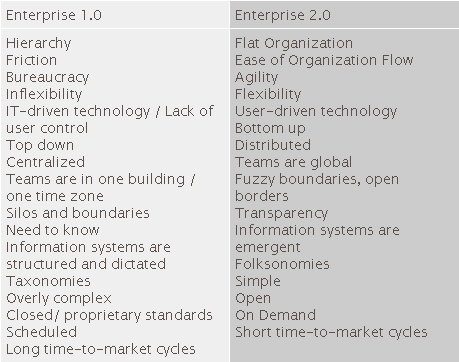 I started writing a post about collaboration within an Enterprise but then realized that I should probably start from square one to make sure that everyone is on the same page with the discussion. Some of you may have heard the term “Enterprise 2.0” being thrown about, I’ve used it quite a bit here, but what does it really mean? I think the best way to describe this is by making an analogy to the evolution of websites. Think back to 1999 when websites were static HTML pages. The content you saw on a website never changed; it was static. Years later we started to see websites evolve into dynamic sites where users had the ability to change and customize content when and how they wanted to (this site is an example). Not only that, but content became social; meaning people had the ability to comment on content or to share it. In a nutshell this evolution of the web is something that we are experiencing across the Enterprise. Traditionally, companies had a way of doing things, the “1999” way so to speak. But now we have new ways of communicating with each other and with companies. We have new technologies and new strategies. Think about how the telephone changed the way businesses function. This evolution of business is what is referred to as Enterprise 2.0 and is based around new technologies and business practices.
I started writing a post about collaboration within an Enterprise but then realized that I should probably start from square one to make sure that everyone is on the same page with the discussion. Some of you may have heard the term “Enterprise 2.0” being thrown about, I’ve used it quite a bit here, but what does it really mean? I think the best way to describe this is by making an analogy to the evolution of websites. Think back to 1999 when websites were static HTML pages. The content you saw on a website never changed; it was static. Years later we started to see websites evolve into dynamic sites where users had the ability to change and customize content when and how they wanted to (this site is an example). Not only that, but content became social; meaning people had the ability to comment on content or to share it. In a nutshell this evolution of the web is something that we are experiencing across the Enterprise. Traditionally, companies had a way of doing things, the “1999” way so to speak. But now we have new ways of communicating with each other and with companies. We have new technologies and new strategies. Think about how the telephone changed the way businesses function. This evolution of business is what is referred to as Enterprise 2.0 and is based around new technologies and business practices.
This image was taken from the Enterprise 2.0 Conference site and depicts what this change looks like:

You can see from the items listed above that the changes we are talking about with Enterprise 2.0 are not small changes. We are fundamentally talking about changing the core of how a company functions. Everything from the technologies to the mindset and methodologies. It’s not an easy task. So what’s the big deal?
Companies have always had a standard way of doing things, especially companies that have been around for a while. It’s not hard to understand why some of these companies are having a hard time grasping this evolution. Imagine that you’re an executive of a company like Coca-Cola and you are being tasked with the internal evolution of Enterprise 2.0. Would you be able to make all of the changes mentioned above? How would you do it? How long would it take? How much would it cost? and What technologies would you use to make it happen? At a very high level these are the four questions that ultimately need to be answered, so go answer ’em! Not that easy right?
Some companies are committed to making the shift and they are slowly starting to make changes to their organization. Other companies think this is a waste of time and choose to stick to their traditional ways of doing things. Who is right and who is wrong? I’m a huge proponent of Enterprise 2.0 and for me the question isn’t how companies are going to do this, it’s when. Enterprise 2.0 will happen and companies are going to evolve or they will die. A similar debate happened around the whole “social media” space where a few of us were screaming that social media is going to change how brands market and build relationships with their customers. Social media was called a fad and many people thought it was going to disappear, and guess what happened? Not only did social media not disappear, it became essential. Now companies left and right are hiring social media managers and strategists. Companies such as Southwest and Comcast have dedicated a good amount of their budget to social media and some companies such as Volkswagen have cut their traditional marketing budgets entirely and shifted them to social media. Interesting to note that Forrester predicted that by 2013 the Enterprise 2.0 space is going to be a 4.6 billion dollar industry.
So those are the basics of Enterprise 2.0. In the following posts we are going to get into a lot more detail so if you have any questions please ask them now. I also highly recommend that you go back and read these posts:
What’s happening with Enterprise 2.0 Adoption?
The phases of Enterprise social business adoption.
Companies interested in Enterprise 2.0 need to take strategy seriously.
